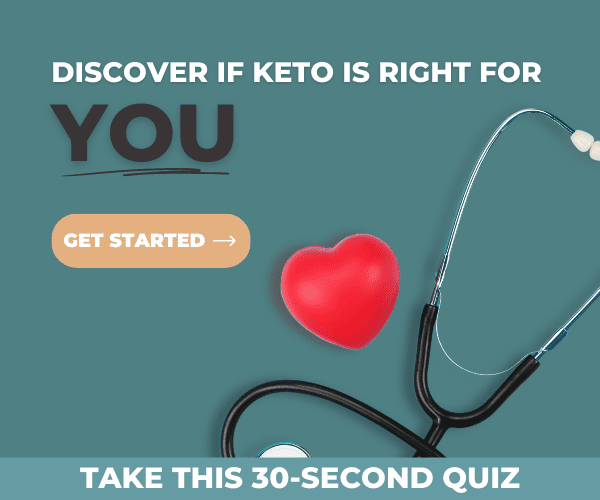Heart Palpitations on Keto? Here’s What Might Be Causing Them, And What to Do About It

That all-too-familiar fluttering or fast pounding of your heart can spring out of nowhere and make you feel uneasy. It’s challenging to navigate your day around a racing heart, especially if you can feel it all the way up in your throat and neck. Heart palpitations are more prevalent in women, but anyone can experience them at any time of life.
What if you’re experiencing heart palpitations on a ketogenic diet? This article discusses why some people might feel heart palpitations on keto and possible solutions.
What Are Heart Palpitations?
Heart palpitations refer to the feeling that your heart is racing, pounding, fluttering, flip-flopping, or skipping beats. They can happen to anyone during rest or activity at any time. You might feel them in your chest, neck, or throat. [1]
Heart palpitations aren’t typically harmful, but in some cases, they might be the result of an abnormal heart rhythm or another more serious cardiac condition that warrants medical attention. If you’re feeling heart palpitations and you’re considering transitioning to a new diet, it’s always a good idea to visit your doctor to address your questions and concerns. Some people have infrequent fluttering of the heart that only lasts for a few seconds, which isn’t usually a cause for concern. If you have worsening or more frequent palpitations and a history of heart disease, it’s best to visit a cardiologist for an evaluation. You should seek medical attention immediately if the palpitations happen with severe shortness of breath, dizziness, fainting, or chest pain.
What Causes Heart Palpitations?
The cause of heart palpitations isn’t always clear. Common triggers or factors might play a role, such as:
- Strenuous exercise
- Medication
- Strong emotional response, such as stress or panic attacks
- Stimulants like nicotine, caffeine, and cocaine
- Fever and certain illnesses or medical conditions
- Insufficient or excessive thyroid hormone
- Hormonal changes associated with pregnancy, menstruation, or menopause
- Low levels of oxygen or potassium
- Anemia
- Dehydration
- Alcohol
A racing heart can sometimes indicate a more serious problem, such as an arrhythmia (abnormal heart rhythm). The right treatment depends on what’s causing it. If the heart palpitations are brought on by caffeine, you can reduce your caffeine intake. A serious condition might require medication, procedure, or surgery from a medical professional.
Why Do Some People Get Heart Palpitations on Keto?
Some people experience heart palpitations when following a ketogenic diet. This typically occurs during the first few weeks while the body and metabolism are transitioning from primarily burning sugar to burning fat for fuel instead. Keto dieters might report a slightly faster heartbeat and feel like their heart is fluttering and beating a little harder than normal.

The two most common causes of heart palpitations on keto are dehydration and mineral deficiencies. As your body transitions to ketosis, you use up glycogen stores, and your insulin levels drop, which causes your kidneys to excrete electrolytes like potassium, magnesium, and sodium. You also lose water weight, which can result in dehydration.
People are more likely to experience various symptoms (keto flu) along with this drop in electrolytes if they aren’t metabolically adapted. Fortunately, these symptoms are usually temporary problems as your metabolism shifts into ketosis and your liver begins producing ketones. Most people are over the keto flu within a week or two.
Solutions to Heart Palpitations on Keto
The potassium, sodium, and magnesium lost during the transition to ketosis are important for your heart and help regulate muscle and nerve function. [2] Replenishing these minerals by supplementing electrolytes and consuming a mineral-rich, healthy, balanced ketogenic diet could diminish heart palpitations.
In addition to supplementing electrolytes and eating a mineral-rich diet, you could try some of the following possible solutions:
- Increase your carb intake and try a more gradual transition to ketosis
- Avoid over-exercising
- Give it time
- Reduce or avoid caffeine or stimulants
- Relieve stress
- Stay hydrated and drink plenty of water
- Increase your salt intake
While these solutions usually work for heart palpitations connected to the switch to a keto diet, if your symptoms are long-term and do not resolve, contact a medical professional.
References
Cleveland Clinic. Heart Palpitations. Retrieved on September 22nd 2023. Heart Palpitations: Symptoms, Causes & Treatment (clevelandclinic.org)
Merck Manual. Overview of Electrolytes. Retrieved on September 22nd 2023. Overview of Electrolytes - Hormonal and Metabolic Disorders - Merck Manuals Consumer Version









